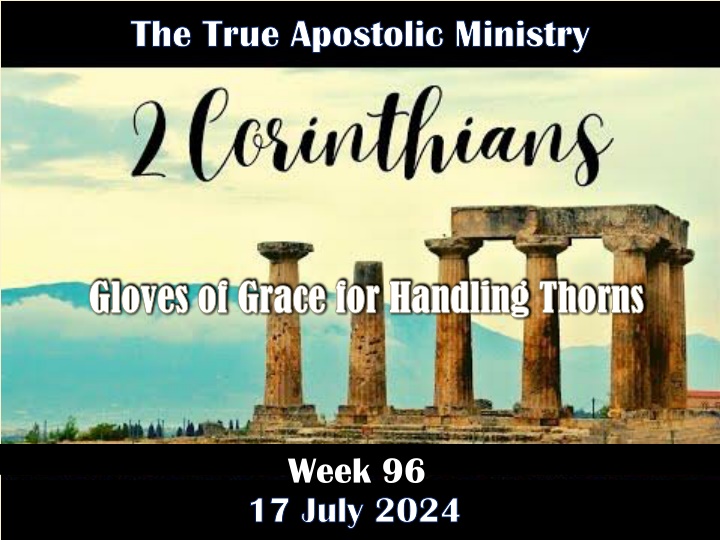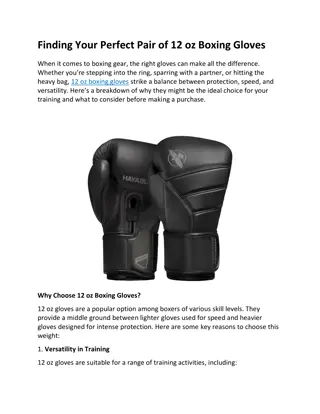
Second Corinthians: Themes, Challenges, and Paul's Message
Explore the profound themes of Second Corinthians focusing on authentic ministry, apostolic authority, unity, and the sufficiency of God's grace. Delve into Paul's insights on vulnerability, weaknesses, and turning hardships into testimonies of strength.
Download Presentation

Please find below an Image/Link to download the presentation.
The content on the website is provided AS IS for your information and personal use only. It may not be sold, licensed, or shared on other websites without obtaining consent from the author. If you encounter any issues during the download, it is possible that the publisher has removed the file from their server.
You are allowed to download the files provided on this website for personal or commercial use, subject to the condition that they are used lawfully. All files are the property of their respective owners.
The content on the website is provided AS IS for your information and personal use only. It may not be sold, licensed, or shared on other websites without obtaining consent from the author.
E N D
Presentation Transcript
The True Apostolic Ministry The True Apostolic Ministry Gloves of Grace for Handling Thorns Gloves of Grace for Handling Thorns Week 96 17 July 2024
2 CORINTHIANS INTRODUCTION In our continuing study of Second Corinthians, the themes of this letter revolves around both the theological concepts and the practical aspects of Christian living. The primary issue at Corinth was the recognition of authentic ministry and submission to apostolic authority. Paul s corrective was to provide guidance and encouragement as the church navigates the challenges that continue to influence their unity, discipline, and spiritual growth. In our study, Paul reluctantly continues with his boasting, sharing an out of body spiritual experience and addressing his persistent struggle with a thorn in the flesh. He stresses the sufficiency of God s grace, and the perfection of His power in our weakness, and shows us how to embrace vulnerabilities and suffering and to depend on Christ, to turns our hardships into testimonies of God's strength.
2 CORINTHIANS - LESSON OVERVIEW In our opening Swindoll says . . . Ours is the age of the self-made person who is more than adequate. Not only do we want to appear as though we have our lives together, but that we have put them together better than most. The word adequate originally comes from the Latin and means make level to or being equal to a requirement. But the idea of more than adequate brings with it a touch of conceit, arrogance, and self-importance. Not only can I do it, but I can do it better than most. I am self-sufficient. The sense is we can measure up to any task. We dislike the thought that we might be unequal to any challenge, or that someone else might be more equal than we are!
2 CORINTHIANS - LESSON OVERVIEW This kind of thinking tends toward competition, rivalry and even open conflict. In our era of self-sufficiency, three kinds of people seem to have it all together. First the highly intelligent, they seem to have an edge on everybody. With keen wits and a couple of academic degrees, the intellectuals try to stay on top of every situation with a cascade of golden phrases meant to outdo the competition. Second the greatly gifted, they tend to dominate pop culture. Talented musicians produce smash hits. Sports icons rake in an obscene amount of cash. Good-looking orators can demand a huge honorarium or draw votes in the political realm. For the gifted, winning comes so easy.
2 CORINTHIANS - LESSON OVERVIEW Third the deeply religious, they appear to glide through life with an appropriate Scripture on their tongues and an abundance of faith to move mountains and create joy in their hearts. They describe their prayer and devotional lives as rich and rewarding and they exude a sense of calm and tranquility. They seem to be so aligned with the Holy Spirit that nothing could pull them off course. However, what we don t see often among the highly intelligent, greatly gifted, and deeply spiritual, are the great gaps of inadequacy that they live with. Paul reminds us in 1 Cor. 4:7, that everything we have from ability to opportunity is a gift from God.
2 CORINTHIANS - LESSON OVERVIEW James, in 1:17 says, Every good and every perfect gift is from above, and comes down from the Father of lights. When God is given us such marvelous abilities. How does He remind us to acknowledge His generosity and to rely on His strength? How does God counter the arrogance of our more-than- enough attitudes and the sin of self-sufficiency? He give us a thorn in the flesh! In our lesson we will gain more insight into this significant and often overlooked reality.
2 CORINTHIANS 12:16 1It is doubtless not profitable for me to boast. I will come to visions and revelations of the Lord: 2 I know a man in Christ who fourteen years ago whether in the body I do not know, or whether out of the body I do not know, God knows such a one was caught up to the third heaven. 3 And I know such a man whether in the body or out of the body I do not know, God knows 4 how he was caught up into Paradise and heard inexpressible words, which it is not lawful for a man to utter. 5 Of such a one I will boast; yet of myself I will not boast, except in my infirmities. 6 For though I might desire to boast, I will not be a fool; for I will speak the truth. But I refrain, lest anyone should think of me above what he sees me to be or hears from me.
2 CORINTHIANS 12:1-6 The Corinthian church had been invaded by Judaizing false teachers who wanted everybody, including Gentiles, to observe every detail of the Law of Moses in the same manner they did. Many had impressive credentials, gifts, skills, and holier- than-everybody else lifestyles that drew the attention of a good percentage of the congregation. Some of the impressionable believers were beginning to be swayed by all the testimonies of great ability. So Paul, who hated boasting found it necessary, in chapter eleven, to remind the Corinthians that his own credentials could stand up against anybody s.
2 CORINTHIANS 12:1-6 Uncomfortable with trumpeting his gifts and experiences, Paul gives us a brief explanation of his view on boasting: Boasting is necessary, thought it is not profitable (12:1). Lowery explains . . . He did it in the hope that it would silence his critics and enable him to minister freely. He also neatly turned his readers attention from these irrelevant credential to those that were an apostle s authentic marks. While, there are circumstance in which, all of us, are expected to talk about our training, experiences, and accomplishment job interviews, and political campaigns, all of these require establishment of some kind of authority or qualifications. Yet, when such necessary self-promotion crosses the line into selfish braggadocio, it accomplishes nothing.
2 CORINTHIANS 12:1-6 People are put off, and God is never impressed. It neither edifies others, nor honors the Lord. Yet the crisis in Corinth required that Paul reestablish his authority among the congregation. So, he adds a postscript to his resume. He grabs their attention with a incident that he had never revealed. He tells of an experience he had fourteen years earlier when he was taken to paradise (12:1-4). Swindoll says . . . Although Paul writes in the three person, most commentators believe he s indirectly describing his own experience. He likely chose to write this way out of modesty or perhaps out of reverence. Fourteen years earlier,than this writing, suggest that this event took place during Paul s wilderness experience just after his conversion.
2 CORINTHIANS 12:1-6 Imagine that Paul had actually been caught up into the highest spiritual realm The Third Heaven! There, in the presence of angelic beings and the Lord Himself, Paul heard things which a man is not permitted to speak (12:4).
2 CORINTHIANS 12:1-6 The experience was so amazingthat Paul couldn t tell if it occurred while in his physical body or out of his body (12:2- 3). All he knew was it was inexpressible (12:4). This brief account of Paul s most astounding visions and revelations of the Lord (12:1) packed a powerful rhetorical punch. Against his boastful, arrogant opponents who loved to draw attention to themselves with their own spiritual experiences. Paul surpasses them with this one experience he kept confidential for over a decade. The fact that he had never shared this experience played well for his counter strategy. While the false teachers trying to boost their perceived authority, point to every little personal experience to toot their horns.
2 CORINTHIANS 12:1-6 Paul sat silently on this indescribable experience for fourteen years, and even now he seems reluctant to let people know about it. Unlike the media-grabbersof today, Paul didn t capitalize on this experience. There were no plans for a TV movie. No vying for speaking engagements or book contracts. No plans for magazine, blogs, or websites articles, no Instagram, X, Facebook or Truth Social post. Paul s inexpressible visit to the other side stayed where it belonged in Paul s own heart and mind. It empowered him with unparalleled knowledge and confidence, and instead of exploiting this experience, Paul kept it under wraps. He waited until the circumstances in his apostolic ministry, required him to reveal it.
2 CORINTHIANS 12:1-6 Uncomfortable with sharing the extreme nature of his visions and revelations of the Lord (12:1). Paul suddenly shakes the Corinthians out of their zeal for the thrilling and supernatural. While such heavenly encounters would be perfectly useful for those who love to boast, from Paul s perspective, he would rather boast about his weaknesses (12:5). Paul wants to make sure no one gives him credit for the glory he experienced, so he doesn t describe it in detail. He does not speaks about his interaction with the Lord. In fact, it wasn t permissible to do so (12:4). Instead, he wants to make sure the Corinthians know he told the truth, so he refuses any temptations to boast further.
2 CORINTHIANS 12:1-6 Why? So no one could put him on a pedestal or canonize him into some kind of super-saint. He would rather people pay attention to his lifestyle and his preaching both of which point people to Jesus Christ instead of himself (12:6).
2 CORINTHIANS 12:7-10 7 And lest I should be exalted above measure by the abundance of the revelations, a thorn in the flesh was given to me, a messenger of Satan to buffet me, lest I be exalted above measure. 8 Concerning this thing I pleaded with the Lord three times that it might depart from me. 9 And He said to me, My grace is sufficient for you, for My strength is made perfect in weakness. Therefore most gladly I will rather boast in my infirmities, that the power of Christ may rest upon me. 10 Therefore I take pleasure in infirmities, in reproaches, in needs, in persecutions, in distresses, for Christ s sake. For when I am weak, then I am strong.
2 CORINTHIANS 12:7-10 Shifting from the heights of heavenly bliss, to the depths of earthly suffering, Paul draws our attention to the flip side of his unparalleled spiritual experience. To keep him from succumbing to pride because of the surpassing greatness of the revelations, God gave Paul a constant reminder of his inadequacy: a thorn in the flesh, a messenger of Satan (12:7). While commentators speculate without end to what this thorn is, Paul give no specific details about it. Some suggest it represented spiritual temptations the urge for Paul to doubt and waver in his faith when things got hard.
2 CORINTHIANS 12:7-10 Others suggest it refers to suffering and persecutions (like those described in chapter eleven). Some narrowed it to one specific kind of enticement: sexual temptation that tested Paul s commitment to remain celibate (1Cor. 7:7). Still others guessed it was some kind of physical handicap, disfigurement, or disease: Perhaps a speech impediment, poor eyesight, a hunchback, epilepsy, malarial fevers, or even migraines. Regardless of its kind, the sting of this thorn was so severe three times Paul pleaded with the Lord to take it away (12:8).
2 CORINTHIANS 12:7-10 Each time the request was denied, yet The Lord did not leave Paul without comfortandcompassion. The Lord Himself explained to Paul why he allowed the affliction to remain: My grace is sufficient for you, for My power is perfected in weakness (12:9). The word perfected is the Greek word (tel ), meaning finished or fulfilled. Through this thorn in Paul s flesh, God demonstrated the power of His all-sufficient grace. And, Paul never forgot! That: God has chosen the weak things of the world to shame the things which are strong (1 Cor. 1:27).
2 CORINTHIANS 12:7-10 Because of this truth, Paul determines to boast about his weaknesses rather than his strengths. So that, through these weaknesses the power of Christ may dwell in him (12:9). Think about it! If Paul had it all together and had been miraculously and wonderfully healed at his first or second request. People might be able to point to Paul s intelligence, giftedness, and devotions as the source of his adequacy. But, because Paul had debilitating physical struggles as well as countless external trials, the astounding success of his ministry can only be attributed to the grace of God.
2 CORINTHIANS 12:7-10 That is how Paul could say, Therefore I am well content with weaknesses, with insults, with distresses, with persecutions, with difficulties, for Christ sake: for when I am weak, then I am strong (12:10).
APPLICATIONS OF THE LESSON When Thorns Rip at Your Adequacy
APPLICATION WHEN THORNS RIP AT YOUR ADEQUACY In closing, Swindollsays. . . The thorns that humbled Paul and allowed him to glow with God s empowering grace are still around today. They come in various forms: trials, sickness, tragedies, difficulties, persecutions, temptations, and the everyday stressors of life. Each of us has at least one small, prickly thorns scratching at our hearts, minds, and bodies, irritating and influencing us. And like Paul, we can learn to handle these thorns with gloves of grace. First look within. Instead of praying that the thorns be removed, remember that God has permitted these things not for our punishment, or harm, but for our good.
APPLICATION WHEN THORNS RIP AT YOUR ADEQUACY The thorns are not in and of themselves good, but the good that God brings out of our pain is worthy of praise. So, as you think about your personal trials, be careful what you call thorns in your life. Spouses, children, and parents are not thorns, while they may bring opportunities to test you patience, these relationships also bring about spiritual growth. They aren t thorns! Remember thorns in Paul s sense involved physical ailments, painful experiences, and emotional trauma something that will be removed in the world to come, but are nevertheless a nagging, unavoidable presence in our life today.
APPLICATION WHEN THORNS RIP AT YOUR ADEQUACY What thorns are you dealing with today? Depression? A chronic illness? A physical debilitation, or some other kind of handicap? Ask the Lord to make His grace sufficient for you. Remember, if God wants to remove the thorn He can. But Paul s experience teaches us that God s power can flow through us even in the midst of our weaknesses. So, embrace your weaknesses. Don t be overwhelmed by the thorns! But, have faith and hope in the good that God can fashion from your thorns.
APPLICATION WHEN THORNS RIP AT YOUR ADEQUACY Second look beyond. Instead gazing at the throbbing thorns, focus on the fragrant grace that will give you hope, strength, peace, and joy in the midst of the pain. Focusing requires us to sometimes close our eyes to the sorrow and grief around us and let our biblically informed imaginations travel to the future where John in Revelation 21:3-5 says this . . . 3 And I heard a loud voice for the throne, saying, Behold, the tabernacle of God is among men, and He will dwell among them, and they shall be His people, and God Himself will be among them, 4 and He will wipe away every tear from their eyes; and there will no longer be any death; there will no longer be any mourning, or crying, or pain; the first things have passed away.
APPLICATION WHEN THORNS RIP AT YOUR ADEQUACY 5 And He who sits on the throne said, Behold, I am making all things new. And He said, Write, for these words are faithful and true. Paul himself caught a glimpse of the paradise reserved in the third heaven (12-2-4). What he saw we can only imagine. Yet we can knew with confidence that Christ will return in His glory to restore this dwelling place and establish His kingdom on earth. In that day, the original curse of thorns and thistles will be lifted (Gen. 3:17-18; Rev. 22:3), and in paradise we will be free from all pain and suffering forever.
NEXT CLASS 24 July 2024 Before next class, read the below chapters in the KJV and in one other versions of the Bible, i.e., NIV, NRSV, TLB, CEV, etc Chapter 12:11 21 Honesty Wrapped in Humility






















